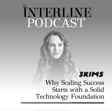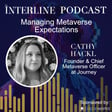Become a Creator today!Start creating today - Share your story with the world!
Start for free
00:00:00
00:00:01

Talking Technology’s Place At The Heart Of Fashion Events, With Andreu David
A unique episode of The Interline Podcast, documenting the way technology is becoming integral to fashion events, and how those major fixtures are changing to keep pace with the industry’s evolution.
Featuring Andreu David, Vice President of SOURCING at MAGIC and Ben Hanson, Editor-in-Chief of The Interline.
This episode is also sponsored by SOURCING at MAGIC. See the show live with SOURCING at MAGIC taking place in Las Vegas from 19th to 21st August, and then in New York from 22nd to 24th September. You can also find out more year-round by visiting www.sourcingatmagic.com.
Transcript
Introduction to AI in Fashion
00:00:02
Speaker
72% of consumers expect online shopping to evolve with generative AI. And they also go on to share that 54% of consumers are willing to share more personal information for that enhanced experience. Welcome to the Interline Podcast. Technology is a deep part of many fashion professionals' day-to-day lives, but it's increasingly starting to touch and transform the workflows of a much wider group of personas, from creative design to sourcing, production, sustainability, and marketing. This is something we've always seen coming at the Interline, but it's also been a driving force behind some big evolutions in how milestone fashion industry events are integrating technology and into both their live shows so and the year-round content and communication around those events.
Technology's Role in Fashion Events
00:00:50
Speaker
A prime example is Sourcing at Magic, which is part of the Magnet Group, formerly in former markets fashion. For several seasons now, they have been putting fashion technology at the heart of some of the industry's biggest events in North America, including bringing the Interline on board as partners to talk about why incorporating technology into major fixtures of the event's calendar matters. so and how those events respond to and grow with a rapid evolution of the fashion industry as a whole. Today, I'm chatting to Andrew David, who's Vice President of Sourcing at Magic. Andrew is also the CEO and Creative Director of his own brand, provides consultation services to fellow entrepreneurs with his company, brand design architects, and teaches fashion design, branding, and merchandising, and business entrepreneurship at Otis College of Art
00:01:38
Speaker
and design in Los Angeles. Across more than 20 years in fashion, he's covered a lot of bases. We also have an interesting format this show because I'll be bringing on our editor-in-chief, Ben Hansen, to talk about the Interline's perspective on bringing technology to major industry events. Appropriately for my chat with Andrew and Ben, the sponsor for this episode is also Sourcing at Magic. While I talk to Andrew about the upcoming events in Las Vegas and New York in August and September, for context their most recent event in Vegas drew over a thousand exhibitors from 40 countries.
00:02:11
Speaker
It's also brought together distinguished business leaders, celebrity guest speakers and thousands of brands and retailers for three days of community experiences and in insightful conversations dedicated to the fashion industry. That event featured three critical pillars, and entrepreneurship, sustainability and social good, with verified sustainable exhibitors and fashion technology. And for this upcoming show, as you'll hear Andrew and Ben talk about soon, The key themes in the technology space in particular are sustainability and AI.
Sustainability and Efficiency in Fashion
00:02:40
Speaker
Sourcing and Magic is proud to be the leading trusted voice and resource to their fashion community, offering a space for important conversations on responsible fashion, sustainability and community building, offer offering valuable guidance for fashion professionals across all stages of the business. Don't miss the fusion.
00:02:56
Speaker
of fashion and innovation at Sourcing and Magic this summer. Explore where style intertwines with technology, offering a glimpse into the future of sourcing. And be sure to check out our recent AI report, which is sponsored by Magnet, as well as keeping an eye out for the next inst installment in our Fashion Technologies Foundation series of downloadable reports soon. This one focused on the fundamentals and the future of generative AI. So let's get into the questions. This is one for both Andrew and Ben. ah What do you believe are the most important strategic considerations for fashion brands at the moment? What is shaping the industry's direction most strongly today? And Andrew, I think let's start with you. Thanks, Emma. um um Thank you for having me here today to speak with you and Ben. I would say that two of the most important strategic considerations for brands um today
00:03:49
Speaker
are efficiency and optimization. um you know Optimizing processes and expenses to be more efficient always results with an improved bottom line. So it's natural for it to be attractive to decision makers of a fashion brand. Really, technologies that support sustainability goals and initiatives, um like reducing inventory, reducing waste, while maximizing profitability are really trends that are happening today. Great. And Ben, what about you? Obviously something very similar to Andrew here, which is, it it's about business model and process, right? And that might sound like a silly thing to say, because brands have always been businesses. But at the moment, there's a big emphasis on those core mechanics, some of the things Andrew just talked about, being as optimized and efficient as you can across design, development, sourcing, production.
00:04:42
Speaker
being profitable, having margin, having organized logistics, being automated, being fast. Having a strong brand still matters because people buy fashion for lifestyle reasons and stuff, but having a strong brand doesn't matter as much if the mechanics aren't really fit for the future.
Data Management and Adaptability
00:04:59
Speaker
And for me, I think fit for the future means that you, as an organization, you've got full visibility into what you're doing. You know where your cost is going. You know where time is going. You've got visibility across your extended life cycle. You've optimized everything you can. You've got the data in order. And it's all really critical now because every brand operates in a really hostile and predictable trading environment.
00:05:25
Speaker
And in that, any even thin improvements in margin or iterative steps to get better fit and improve loyalty, they can turn into a really big competitive edge. I think that stuff's also critical for tomorrow because whatever the next disruption ends up being, whether it's from tech in the form of AI or something else, or whether it's from the wider world in the form of geopolitical disruption, trade policy shifts or whatever, you never know where that thing's going to come from. So it's not just about being a good brand, it's about being a good business. And being a good business means being a business that understands itself and is prepared to kind of take advantage of and bring in some of the tools that might help in the near future. Yeah, that makes a lot of sense. um And I'm going to ask you both again, because I think you both have insight into this.
00:06:14
Speaker
Why do you believe it's so important for technology to be represented at a long running milestone event like sourcing? And in your opinion, how has that importance changed over the last few years? ah Ben, you were just speaking. Can we start again with you? ah We can, yeah. And Andrew is going to have the answer to the bulk of a lot of this, one of somebody with the most trade show organizing experience. ah But for me, the mandate here has been pretty consistent for a while, which is technology touches and influences essentially every part of the fashion value chain. So it makes perfect sense for there to be a big and a growing technology presence in a footprint that shows like s Sourcing Imagine could bring together so many different parts of that value chain.
00:07:00
Speaker
Now, obviously, you have other opportunities for people to come together and talk about specific initiatives and places to talk about small slices of the tech landscape profession. But if you've got thousands or tens of thousands of people coming to a destination year in, season in, season out to conduct the core business of fashion, then those people need to be more aware of what technology can do for them, what it can't, how it's going to affect the way that they operate in the future. um I think the other part is there's a lot of very direct hooks between technology and process. and you know The risk of sounding like a management consultant. A lot of the changes that brands, retailers, manufacturers, mills need to make in order to stay competitive, like Andrew said, be efficient, be sustainable, be smart. They're processing cultural changes and processing cultural changes that generate and consume a lot of data and that need technology support to be properly realized.
00:07:59
Speaker
You know, and but you know this, we're very careful not to be like blind tech evangelists at the interline. But we are we are very clear on the position that a lot of what fashion organizations, whether they're emerging designers or big multinationals, A lot of what they want to accomplish and what they need to accomplish is going to have a big tech component to it. And that means having a big tech component to major industry events as well. am I completely agree with Ben. you know Integrating technology, it's almost a need to do for a business. It's become very vital for that business to survive.
00:08:36
Speaker
you know Like ah generative ah AI, um it really has allowed brands to better understand and read the needs of their customer. And sometimes today, like ah consumers are expecting it. it's a The quicker response rate with a brand's customer service is expected. um So you know having brands understand ah the better you know better understanding the needs of their consumers, behaviors, and shopping patterns really allows them to enhance that customer experience. ah you know There's an article on from Sourcing Journal um that says that 72% of consumers expect online shopping to evolve with generative AI. And they also go on to share that 54% of consumers are willing to share more personal information for that enhanced experience. So it's it's really, I think that is a trend that's happening in our industry. you know Using and integrating technology is so important um to that business's profitability.
Shift in Tech Management
00:09:34
Speaker
Well, speaking of you, Andrew, you've spent a lot of time working directly in the industry, especially in the luxury sector, and you now oversee a major industry event. How have you seen fashion's attitude to technology change over time and how much of that is down to the technology itself versus the industry mindset? Yes, i um thanks for giving me that little bit of a shout out of my career. yeah it's It's been a transformative one, an ever-evolving one for me. um And today I find myself as leading a major event um for our industry.
00:10:15
Speaker
And somehow I see it as the old guard and the new guard. um you know I'm also a professor at Otis College of Art um part time. And that's why I say old guard, new guard because there I see those who are just entering and will be just entering the market. And I see those who are my peers who have been in industry for quite a long time. And there is this notion of proven methods versus new. So as we're integrating um technology into the curriculum, you know the younger generation, um they are more inept to take on technology. um And rightfully so, because that's what they grew up on. um Whereas us, those who have been around longer, um we have a tendency to go back to what's comfortable and what's um known and also proven.
00:11:10
Speaker
for rightfully so as well in terms of profitability. So um when it comes to that, though, you know, definitely I have seen a shift in the mindset um with some of I call them the veterans to integrate and learn technologies that advance and enhance productivity, as well as reduce cost. um And also not to mention that there is an influence to be sustainable in today's industry. Right. So all of these couple together, they really drive um that change and that mindset. So being able to use technology um for innovation is not only a necessity, but it also meets the demands of consumers.
00:11:58
Speaker
Yeah, absolutely. And then I'm wondering if you agree, you're also not new to the fashion industry. um How have you seen the personas and the people involved in technology shift over time? And can you give me some insight into why you think that evolution has happened? Sure, I i definitely don't have a story to career in brand. And that side of things as Andrew does, he's definitely got me beat there. But from from a tech perspective, I think the key shift has been where technology projects are driven from and why, kind of within brand and retail organizations. Now, like, obviously obviously, everything is to some extent a tech project. So I'm not I'm not talking about minor things. I mean, big sweeping changes like 3D, Andrew mentioned, generative AI, sustainability, retail transformation, all that kind of stuff. Historically,
00:12:52
Speaker
those would have come down as edicts from the executive level, right? You would have had people at the very top, not just in terms of saying this is what we want to do, but very hands-on in terms of these are the tools we're going to use to do it. And I think you only need to look at luxury houses, and that's definitely somewhere Andrew's got more experience than I have to see how it used to be the case that groups would buy into platforms and solutions at the top level. And they'd encourage all the brands that sit underneath them to conform to a single software suite in a single way of working. um That practice doesn't really happen as much anymore within groups. It still happens, but not as often. And the same principle applies
00:13:36
Speaker
within individual brands. So I think where you used to see CEOs, CIOs, CTOs charged with not just defining the business strategy, but also having a very hands-on determining role in the tools that you use to implement it. Now it's more about influencing the direction of those tools. um And a lot of technology initiatives now, on the scale we're talking about, they're coming up more from grassroots, from kind of heads of department, from process champions, the kinds of people who they know the specific areas of their business. Maybe they're VP of design. Maybe they're a head of sourcing. Maybe they are somebody with oversight of e-commerce. They know the challenges and the possibilities.
00:14:22
Speaker
And they're the ones who are really equipped to start choosing those tools, choosing things that they know are going to be able to make their lives easier and the lives of their colleagues easier, and to then drive those transformations upwards. And I think it's probably not a coincidence that some of them are what Andrew described as like the new guide. Some of them are the people who have the experience with technology from education, from their personal lives, that they know what it can and can't do and then they take that into their professional lives and they say, well, we could do things differently and let me drive that upwards and make a business case for why why that's the case. um So yeah, that's that that for me in the major shift in how brands in particular and people within them think about tech and where tech projects begin.
Customization and Solution-Fit
00:15:11
Speaker
I wanted to jump in um back in and that's great what you said, Ben. There's a real beauty with technology in that there is a way to customize it to the experience or the the needs of a particular enterprise, right? So that is, I think what is happening with our industry today is businesses are looking at their own needs. whether that is part of you know ah an entity as large as these corporations with all their sub-brands within, that all the sub-brands are looking at their own businesses and and catering the technology to fit that audience. and That is the beauty of what technology can do. Andrew, I want to ask you about the cornerstone themes um for the upcoming Sourcing at Magic events in August.
00:16:01
Speaker
ah in Las Vegas, as well as in September in New York. um I'll ask you first, Andrew and Ben, I'd also like to hear from you. um Why is it that sustainability and AI are the two themes four for this year? When I took over as lead for the Sourcing at Magic event, close to, I think, five years ago, um I worked with my team to create three main pillars and two of them happen to be sustainability and fashion fashion technology. um Both um i make profound impacts on our fashion industry and have potential to shape the future. And so what you'll find at our event and represented, we have verified sustainable suppliers, some educational programming,
00:16:51
Speaker
and also various activities on the show floor that relate to these cornerstones. um For the upcoming Las Vegas and New York editions of our events, ah we have these two pillars as represented, and specifically for technology, we have AI as a focus. you know AI, or artificial intelligence, is ah really transforming the way we design, produce, and market fashion. They really provide analytics, trend forecasting, various and numerous things that they do to enhance um our businesses. So um so we find that with our event, it's important for us to equip our attendees
00:17:35
Speaker
with knowledge and tools that really they can use to navigate critical areas of their business. Yeah. And Ben, how about you? So um I don't think i don't think there there are two bigger challenges than sustainability and AI. And i'm i'm I'm consciously calling AI a challenge rather than an opportunity because I don't and don't think it's anything like as clear cut as saying, because I think a lot of people will say, AI is here. Wonderful. It's time to capitalize on it. I think it's more nuanced than that. And I think there's a challenge involved in turning something that transformative to your advantage.
00:18:18
Speaker
um Human-made climate change is one of the most existential threats of our time, and fashion does contribute to it. I think it's interesting to consider how much of the sourcing base is going to be impacted by climate change. It's literally impossible to ignore how much of an impact this is all going to have on the people that make up the fashion value chain. And, and that goes much deeper than compliance and preferred materials, which is, which is why this is such a big focus on the source of magic, because it's a fundamentally different way of working profession. And it changes the landscape of sourcing. And it's a conversation that has to have every stakeholder involved, not just brands, not just suppliers, not just trade bodies and governments, everyone. And a lot of those personas are present at sourcing.
00:19:07
Speaker
And then with AI, there's no bigger debate right now. Having an AI strategy means having a position on tech, ethics, culture, creativity. It's a society-wide transformation that's being driven by tech, but it's not just a tech initiative. Everybody has an opinion about AI and everybody should be involved in that conversation. um We've actually just released yesterday, as you know, Emma, our first AI report. And Kelly Hellfmann, who Andrew works closely with, she wrote in her introduction that having those practical conversations about AI is one of the biggest priorities at the moment.
00:19:40
Speaker
And I know we're also working at the moment on a the next In Our Fashion Technology Foundation series of reports ah between the Interline and Sourcing It Magic, which will be out probably by the time people listen to this episode or very soon thereafter. So there's some content to go after and read there as well outside of the shows, but hopefully that gives you a good perspective on why I think those two are the key topics for the shows themselves.
Universal Yet Specific Tech Solutions
00:20:08
Speaker
Absolutely. And before we go into some more of the themes that you mentioned, um, we'll pick that apart in the next few questions. I just want to ask Andrew a little bit more about the event. Um, so sourcing has always been part of the wider magic event and community, but it's one of the key parts of what used to be called in former markets fashion, which is now magnet group, which Ben, you you just mentioned, um, Andrew, what does it mean to you to have that platform where vital industry conversations happen year round, not just ah during the live events. you know um Magnet was created to be an new ecosystem that supports our entire fashion industry. It's communities, and so no matter where you sit on that system, you'll have resources and content that is relevant to you. right
00:20:59
Speaker
and so Magnet was purposely um created to be a cross-section of the industry which opens more opportunities to connect both in-person at our shows as well as community events um happening throughout the year. um So we'll have live online and on-demand program content and insights available to everyone. That's really good to know. It's it's good to play sourcing um in this wider conversation that we're going to have now um that we've been having and which we're going to del delve a bit deeper into now. So Ben, can you tell me why you think technology is universal, um but also specific to different market segments? ah There are solutions for big enterprises, micro brands and everyone in between, but do they all face the same challenges? ah Do they need the same things or does technology need to be bespoke for each sector?
00:21:57
Speaker
ah We've touched on this a little bit earlier in this conversation, but if you wouldn't mind going a bit deeper into this in this answer. Yeah, absolutely. I think Andrew's done a good job of looping in the fact that these the pillows that are chosen for the events and for the content were chosen for a reason. And that reason is that that universality is part of it. but you know Everybody faces the same challenges. They face them in different degrees, but sustainability, AI, and 3D, all these things, they they have an impact and they have a role to play across businesses of all shapes and sizes.
00:22:35
Speaker
The way I look at this I think is that you have broad challenges and broad opportunities in common and there are best practices within fashion that brands of any size, retailers of any size, the buyers of any size can look to and say this is a logical way of approaching things, this is a way of doing things that is applicable to me and I don't think you need tools for each market segment. So i don't don't get me wrong, there's specialization and things in there. But if you're a luxury brand, for instance, you don't need a luxury PLM. Or if you're a mass market brand, you don't need a mass market 3D tool. If you're an emerging designer, you don't need a specific tool that is just for emerging designers to help you manage your sustainability.
00:23:26
Speaker
you might need processes or workflows or right size things that are specific to that. But everybody has the same mandate, everybody has the same ask, which is get more visibility into your supply chain, design in 3D, figure out how to incorporate generative AI into your design development, super content production, orchestration, etc, which is one of those these are some of the key topics that we really touch on in the AI report. i mentioned before sponsored by Magda and the other one that we have coming up that we're working on. And what's interesting, especially when you think about AI, is
00:24:02
Speaker
Everybody essentially has access to the same tools and the same capabilities. And that's really the first time that that's happened with a technology revolution. It's normally the case that something new becomes available and the big brands with the big budgets and the time to bring in management consultants and everything are the ones who get to take advantage of it first. And then it slowly cascades its way down into smaller organizations. I think now this is the first time where everyone has access to the same tools at the same time, and those tools are transformative. so That's why technology is really universal and universally accessible.
Leveling the Playing Field with AI
00:24:38
Speaker
and What's really interesting in that angle to me is that if you want to launch a new brand, if you're an entrepreneur, you're somebody thinking about, what do I do with AI? What do I do with 3D? Reading the reports we put together is a good starting point.
00:24:52
Speaker
but you can take advantage of those same tools. I met somebody at a previous sourcing show who's done exactly that. She's recently written an article for the Interline about it. And it's been fascinating to me to see that journey of how I remember technology being only available to the biggest companies a decade ago. And now you can start brand and you can access the same tools that anybody else can. And I think that's a really powerful thing and also another really powerful argument for having technology present at shows like Associate Magic where there's such a diversity of sizes of different brands and different designers and businesses of different types. so
00:25:30
Speaker
Yeah, absolutely. um And just touching on that diversity, Andrew, I want to ask you a question about the event. um But more than that, it's about um it's important for people to remember that ah events like sourcing are not just for entrepreneurs, brands, and retailers, but also for manufacturers, suppliers, trade bodies, and more. um How do you think about bringing together that whole value value chain? and How are you working to connect all those different personas with technology at the next event and beyond? Somewhat tagging onto a fan just said just a few moments ago, you know, i you know we consider sourcing at Magic as a conduit. It's really a place that provides many opportunities for suppliers and buyers to be able to interact and network.
00:26:26
Speaker
So for a technology enterprise or a platform, um there's huge opportunity for them to access as you say, the full value chain. um We have all fashion industry walks of life come to our events. And so if the goal for an enterprise is to get in front of as many people with their technology, then definitely ledgering like leveraging our events is that perfect vehicle.
00:26:59
Speaker
Yeah, absolutely. And as Ben said, it that's a really powerful thing. um I'm going to start wrapping up the interview with you both
Challenges and Opportunities in Fashion Tech
00:27:08
Speaker
now. It's been an absolute delight to hear you both speaking on this topic, which you both clearly know so much about. um And my last question, I'm going to do it in one. um If you could give listeners one piece of advice about a particular industry challenge, ah which can be general or segment specific to prepare for and how, what would it be? And then for the second part of the question, I want to know about the opposite side, what do you recommend as the most important opportunity for listeners to be ahead of in a positive sense and how should they approach it? From a challenge point of view, I think the biggest
00:27:52
Speaker
The biggest s one that brands of all shapes and sizes will face is having the right data in the right format available to them. to take advantage of. Because everything that you're being asked to do as a brand, you know, disclosure, sustainability, all the profitability stuff, like I really liked Andrew's scene setting at the beginning where he was saying how important it is now to be efficient, to be streamlined, to be optimised. All that optimisation really hinges on having the right information to hand in the right format.
00:28:27
Speaker
and And everything that you might want to do, so forget the stuff that's asked of you, the stuff that you want to do, you want to launch a new product line, you want to expand into a new market, you want to get closer to your consumer, you want to reduce returns, like all these kinds of things. All of that hinges on having access to information. And that access is not easy to build. That requires you to really look at every element of your business, all the systems you use, all the data flows you have, everything that might not be connected at the moment and connect it. And it's a hard and it's a thankless task, but it's a necessary task, I think, to do a lot of the things the industry wants to do. On the opportunity side, it's everything I said before about technology being that universal, great level that
00:29:13
Speaker
you know If you want to spin up and use the same massive systems that the biggest companies in the world can even do, you can. and AI, I don't want to harp on too much about it, but that's very much a prime example of having those tools available to you. I would encourage people to read the report that we've, did the full AI report we just put out, and the one the foundation series one we have coming up, which is more of a gentle introduction to that area, because they will give you a really strong overview of what's happening in AI and how you can potentially turn it to your advantage.
00:29:46
Speaker
so my conclusion would be have your data house in order as much as you can. But if you're a smaller organization, you've got a unique opportunity to use technology to leapfrog the bigger companies that have deeper technology legacies and technology debt. And Andrew, will you share your your final thoughts as Ben did with the challenge and then the opportunity? From my point of view, The biggest challenge with our industry is accelerated change. um For example, using adaptive technologies. you know Our industry hasn't been designed with a rapid response to change um due to systems, profitability, and just plain setup, especially when it comes to manufacturers and suppliers. there
00:30:38
Speaker
the way their factories and um facilities have been set up. So it's very hard to change um because it leads to lots of cost and expense, right? But definitely learning to grow and how to adapt, even if it's a slow migration um to that new um is is needed. so that you know you won't be left behind and cease to exist. It's a necessity for businesses. right And so my ah you know advice and opportunity would be is to change that mindset, you know get away from the fear, and just do and start something.
00:31:25
Speaker
um Same thing with sustainability. That's something that we speak about when we talk about sustainability, is that it's it's sometimes daunting to think that you know you're going to flip your business overnight to become sustainable. But that's really not the journey. It's just starting it right and doing a little bit each time, each year, each you know couple years, just so you get on the track. right that that's That's what we like to think. um so
00:31:55
Speaker
a business learning and understanding how to use technologies to enhance and benefit their needs. It's what's important, like what fits you, what is good for you. And really the most important is, is, you know, for business is customers, right? Customers, which leads to profitability. And so they enhancing the experiences of your customers, using data analytics and AI, as Ben spoke about earlier, is a crucial vital part of the change that needs to happen with businesses today. ah you know Focusing personalized customer experiences can really differentiate um your brand, increase that customer loyalty, and then really drive growth.
Conclusion: Future of Fashion Tech
00:32:41
Speaker
Well said, absolutely. and um I think with that we've come to the end of this wonderful episode of the Interline podcast with Sourcing at Magic um with Ben and Andrew. Thank you so much both of you for your time. I think this has been a really enlightening conversation and really important themes when it comes to first of all sustainability and then of course what we're experiencing with AI um and all the rest. So we're going to sign off now. Thank you for listening and um we'll see you back soon. Thank you both. Thanks Emma and Ben for having me and we'll see you at Sourcing at Magic either in Las Vegas or New York.
00:33:26
Speaker
thank you very much for having me as well i which is a very weird thing to say yeah thanks you thanks for having me as a guest As well as thanking Andrew for being our guest, I want to close by thanking our friends at Sourcing at Magic for supporting this episode of the show. With a forward-thinking approach and commitment to the evolution of the global apparel supply chain, Sourcing at Magic consistently provides access to emerging fashion technology solutions sustainable resources, educational content, networking, and extended visibility into the industry's most critical global issues. More than just events, Magnet and Sourcing at Magic within Magnet Group is a deeply rooted community who are working towards fulfilling the vision of a more connected, sustainable, and collaborative fashion industry. With the next shows is taking place in the Las Vegas Convention Center from the 19th to the 21st of August and then in New York from the 22nd to the 24th of September,
00:34:17
Speaker
There are two upcoming opportunities to join in the AI conversation and the wider technology fashion conversation, or you can find out about the year-round information offered by Sourcing at Magic at www.sourcingatmagic.com. Lastly, you can download our newly released AI report directly from the Interline, which is supported by Magnet, and soon you'll be able to grab the next in our Fashion Technology Foundation series of collaborative reports created in partnership with Sourcing at Magic. As always, if you're interested in hearing my next fashion technology interview, make sure you subscribe to the Interline podcast, wherever you listen to podcasts and give us a follow on LinkedIn and Instagram and subscribe to our weekly newsletter. That newsletter can be found on our website by clicking the newsletter icon on the top right hand corner of the screen, and it will be delivered to your inbox every Friday. Thanks so much for listening and see you soon.


















